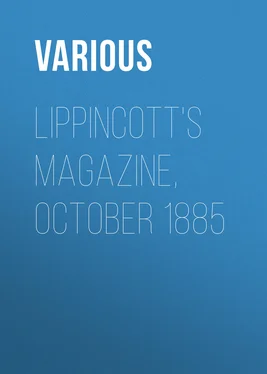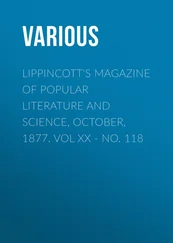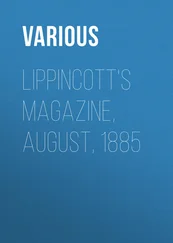Various - Lippincott's Magazine, October 1885
Здесь есть возможность читать онлайн «Various - Lippincott's Magazine, October 1885» — ознакомительный отрывок электронной книги совершенно бесплатно, а после прочтения отрывка купить полную версию. В некоторых случаях можно слушать аудио, скачать через торрент в формате fb2 и присутствует краткое содержание. Издательство: Иностранный паблик, Жанр: foreign_antique, periodic, foreign_edu, на английском языке. Описание произведения, (предисловие) а так же отзывы посетителей доступны на портале библиотеки ЛибКат.
- Название:Lippincott's Magazine, October 1885
- Автор:
- Издательство:Иностранный паблик
- Жанр:
- Год:неизвестен
- ISBN:нет данных
- Рейтинг книги:4 / 5. Голосов: 1
-
Избранное:Добавить в избранное
- Отзывы:
-
Ваша оценка:
- 80
- 1
- 2
- 3
- 4
- 5
Lippincott's Magazine, October 1885: краткое содержание, описание и аннотация
Предлагаем к чтению аннотацию, описание, краткое содержание или предисловие (зависит от того, что написал сам автор книги «Lippincott's Magazine, October 1885»). Если вы не нашли необходимую информацию о книге — напишите в комментариях, мы постараемся отыскать её.
Lippincott's Magazine, October 1885 — читать онлайн ознакомительный отрывок
Ниже представлен текст книги, разбитый по страницам. Система сохранения места последней прочитанной страницы, позволяет с удобством читать онлайн бесплатно книгу «Lippincott's Magazine, October 1885», без необходимости каждый раз заново искать на чём Вы остановились. Поставьте закладку, и сможете в любой момент перейти на страницу, на которой закончили чтение.
Интервал:
Закладка:
In November, when the broom on the sides of the hills was a fine pink-brown, and when the wet places which the flood had left abounded in jack-snipe and afforded the neatest shooting in the world, I turned my back upon the ranch, where I had been very prodigal of the best of riches,—"the loose change of time." I did so with a warm feeling of regret,—a feeling somewhat tempered by the thought that I should soon be in a region of homes, constant greetings, and the morning newspapers. But after a few weeks of the morning newspapers it has been borne in upon me that a great deal is to be said for the place which does not know them.
E.C. REYNOLDS.
THE LADY LAWYER'S FIRST CLIENT
Mrs. Tarbell sat in her office, pretending to read a law-journal, but really looking at her name on the office door; and she was not without justification, perhaps, seeing that it had taken her six years to get it there. Furthermore, though it was six weeks since it had been lettered upon the glass panel, she had as yet found nothing to do but look at it. She was at last a lawyer; she had triumphed over prejudice and ridicule; and a young lawyer has three privileges,—he may write Esquire after his name, he is exempt from jury duty, and he can wait for clients. Mrs. Tarbell had always been exempt from jury duty, and her brother told her that, historically speaking, she ought to be called equestrienne , if she was to have any title: so it seemed that it was only left to her to wait for clients and contemplate her sign. The sign read,—
Ellen G. Tarbell,
Alex. H. Juddson,
Attorneys-at-Law.
Commissioner for Colorado.
Mrs. Tarbell had been a Miss Juddson before her marriage with – Tarbell, Esq. (of Hinson & Tarbell, mourning goods), and Mr. Alexander H. Juddson was her brother. When Mr. Tarbell died, his widow told her family and friends that she was going to read law.
Mrs. Tarbell had always been a woman of progressive notions, but this was going too far. Her family and some of her friends were short-sighted enough to attempt to argue the general question,—namely, ought women to have Rights? When Mrs. Tarbell proved to them that they were both unfair and illogical, they then said that, though they had no objection to other women making lawyers of themselves, they did not see the necessity in her case.
Mrs. Tarbell replied that she must get a living; and it was quite true that the late Tarbell had failed a few months before his death, leaving his widow rather poorly off; for he had not put his property in her name before making an assignment. And Mrs. Tarbell went on to say that, as she could not be a nurse, and would not be a governess or keep a boarding-house, she would read law. It was reported at the time that Mr. Juddson said he hoped his sister would go and read law, if anywhere, in Colorado, for which State it was he, of course, who was the commissioner; but, whether this report were true or not, Mrs. Tarbell stayed at home and pursued her studies under his direction.
After going through all sorts of examinations, at which she flung herself determinedly, and which she kept on passing with the greatest credit, after meeting with innumerable disappointments and delays, after being politely told by one judge after another that she was a woman, and therefore could not be a man,—hence, a fortiori , she could not be a lawyer,—after six years, I say, Mrs. Tarbell succeeded. Her name went on the list of attorneys. The court-clerk gave her a certificate, and received two dollars and sixty cents. The newspapers chronicled the circumstance. Her friends were triumphant. Judge Measy, who admitted her to the bar, was compared to Lord Mansfield and to Mr. Lincoln.
But marriage is not the only lofty undertaking attended by petty miseries. Mrs. Tarbell could bear her great misfortunes with courage and resolution: as she had great hopes, so she expected great disasters. Not Lars Porsenna of Clusium himself was more clapped on the back, and huzzahed after, and backed up by the augurs, nor more frequently told that he was the beloved of heaven, than Mrs. Tarbell had been by her soothsayers and partisans. At first this was all very well, but afterward it grew tiresome. If Mrs. Tarbell, emerging from widowhood and placing herself in the van of feminine progress, was really a pioneer in a heaven sent mission (as perhaps she was), there was no need to repeat the phrase so often. When two or three years had gone by, and it began to be apparent that Mrs. Tarbell had a long and up-hill struggle before her, she became very impatient of enthusiasm. She had never liked it, even when the female welkin (if there be such a thing) had first rung with applause for her, and now it was painfully uncomfortable. Mrs. Lucretia Pegley (authoress of "Woman's Wrongs," "The Weaker Sex?" "Eve v. Adam," etc., etc., editor of "Woman's Sphere," and chief contributor to the "Coming Era;" her friends called her a Boadicea, and denied that she had withdrawn from the study of medicine because she had fainted at her first operation),—Mrs. Pegley observed her friend's shortness of temper, and took her to task about it. "Ellen Tarbell," she said, "you surprise me very much. Do you wish to give the impression that your motives are purely personal and—forgive me, but the word is necessary—selfish? that you have no interest in the movement in which you are a pioneer? that your heart is not with the cause which after so many years of weary waiting looks to you for advancement? Mr. Botts is a most worthy and indefatigable man; perhaps a trifle too much addicted to repetition for the sake of rhetorical effect,—a thing, I admit, very trying; but it is of the highest importance (I say this between ourselves, of course, and you may imagine that I would not give publicity to such a statement),—it is of the highest importance that the feelings of our—hem—masculine colleagues should not be—"
"Yes, yes," interrupted Mrs. Tarbell hastily, "I appreciate that fully,
I assure you. But yesterday evening I was rather tired, and I—"
"Tired!" said Mrs. Pegley, in the voice of acute anguish which caused her to be known as a woman of the most extraordinary intensity of convictions. "It is a wonder we are not all in our graves ," she added, in tones whose sombre depth was brightened by a little colloquial levity, for she felt that she had been too severe with Mrs. Tarbell. "Still," she continued, "after Mr. Bott's very flattering remarks you might have spoken with a little more—er— earnestness and—er— vigor yourself, you know. And for such an audience as we had last night, three minutes is really—"
After this, Mrs. Tarbell resolved that her next effort at public speaking should be made before an American jury, or not at all. Indeed, she went so far as to think it a great mistake to suppose that woman's cause could not be advanced without calling meetings and haranguing them till eleven o'clock at night. Very likely her ideals were still of the highest order, and certainly she still hoped that when women were allowed to practise law the law would be so changed that you would hardly recognize it; but she wanted to carry on her part of the work occultly and quietly. She had got over a good many of her own illusions, and she was taking a more practical view of life. She smiled when she thought of the prophecies which had been made about her, and she no longer read the paragraphs about herself in the newspapers. She kept her brother's dockets and drew his papers. Alexander frowned a good deal, and said it wasn't necessary, but she insisted that she must pay him in some way for her education. She put his desk in order and gave him new papers every other day, which practices he never could get her to forego. In short, she settled down into a routine of study, office-work, and regularly recurring attempts to get in . And when she finally did get in, she had become a cynic. Everybody remembers, of course, how at the end of his last term Judge Oldwigg announced his intention to retire into private life and decline a reelection, and how the managers of the party in power chose Judge Measy as their candidate for the vacant place. The prospective judge was waited on privately by a deputation of Mrs. Tarbell's friends, headed by Mrs. Pegley, and asked to define his position on the Tarbell question. The deputation did not contain many voters, and no bargain which Mr. Measy, as he then was, could have made with it would have increased his majority very largely: as he was pretty sure of a majority, he must be cleared of all suspicion of making a bargain. But he did deliver to Mrs. Pegley an oracular answer, which was in course of time interpreted in Mrs. Tarbell's favor. She came up before him; Mr. Juddson made the motion which he had so often made before, and made it, I regret to say, in rather hurried tones, when, to everybody's surprise, Judge Measy produced a manuscript and read it out, and proved that a lawyer was a person who practiced law, and that therefore, as a woman was a person, she could be a lawyer, interspersing his remarks with graceful historical allusions and several profound reflections upon the design of Nature in creating the female sex. Then, acting as man, not judge, he descended to the side-bar, beckoned to Mrs. Tarbell, grasped her by the hand, and made her a speech. "Madam," said the courtly judge, "Mrs. Tarbell, I congratulate you,"—which was one for himself as well,—"and let me add that it gives me the sincerest satisfaction to be able to testify in this manner to the veneration which I have always entertained for woman; and I am quite sure that in no long space of time you will have proved to us that the law cannot say it has nothing to gain from her refining influence. For I remember my own mother, Mrs. Tarbell," said Judge Measy. The bar listened in awed admiration. Mrs. Tarbell bit her lips, bowed, and thanked his honor as best she could. The idea of suggesting that she was anybody's mother, or that even if she had a family that was any reason for permitting her to be a barrister! But from the other side of the court-room was heard an expressive rustling, and audible whispers of satisfaction were wafted across the lawyers on their chairs. Mrs. Pegley and her train were sitting by, radiant, triumphant, majestic. The dignity of motherhood was vindicated.
Читать дальшеИнтервал:
Закладка:
Похожие книги на «Lippincott's Magazine, October 1885»
Представляем Вашему вниманию похожие книги на «Lippincott's Magazine, October 1885» списком для выбора. Мы отобрали схожую по названию и смыслу литературу в надежде предоставить читателям больше вариантов отыскать новые, интересные, ещё непрочитанные произведения.
Обсуждение, отзывы о книге «Lippincott's Magazine, October 1885» и просто собственные мнения читателей. Оставьте ваши комментарии, напишите, что Вы думаете о произведении, его смысле или главных героях. Укажите что конкретно понравилось, а что нет, и почему Вы так считаете.












